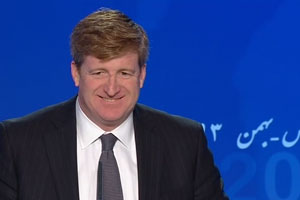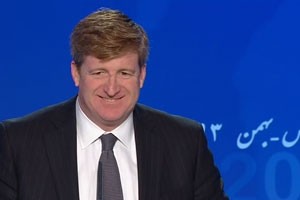

Former US Congressman Patrick J. Kennedy has written in the Thursday edition of the Providence Journal about how Iranian President Hassan Rouhani is not at all “moderate”, despite Western perception, and that such a gap between perception and reality has existed for “more than three decades.”
“Countless instances since the 2013 election of Iranian President Hassan Rouhani — including most recently the state-sanctioned torching of the Saudi embassy in Tehran — should have dispelled the notion that we are dealing with a moderate reformist at the helm of the Islamic Republic,” Mr Kennedy writes. “Sectarian conflict is on the rise with Iran backing Syria’s Assad, Hezbollah, an anti-American insurgency in Yemen and radical Shia factions in Iraq.”
The former Congressman noted how these developments “have proven the accuracy of analyses from sources like the National Council of Resistance of Iran (NCRI), which insisted from the start that moderation was not a realistic prospect under the existing theocratic regime.”
“Indeed, the illusion of a “moderate” Iranian president has persisted for more than three decades, despite its nonexistence in reality. Rouhani is only the latest to artfully exploit this fantasy and play into a naïve, aspirational worldview among many in the West about Tehran’s behavior and intentions.”
Mr Kennedy reminds us that Rouhani simply “Counts on his audience ignoring the fact that Islamic extremism is at the heart of Tehran’s theocracy.” And that, in Iran, “The country’s clerical leadership has devoted much of its power and authority to establishing itself as the leading voice for radical Islam.”
“It has done this by supporting terrorist groups such as Hezbollah and their attacks on Middle Eastern and Western targets, as well as by spreading anti-Western and anti-Semitic vitriol through extensive propaganda networks.”
Beyond this, Mr Kennedy notes that it is actually in the regimes constitution ‘“to export the extremist ‘revolution’ and encourage the spread of strict sharia law beyond Iran’s borders.”’ Therefore, Mr Kennedy asserts, it has never been the NCRI’s view “that progressive change could come from within a state in which extremism is woven into its DNA.”
Both the US and “The European Union has continued to pursue rapprochement and expanded trade with Iran despite signs that the Islamic Republic is not cooperating with last year’s July 14 nuclear agreement.”
Iran “Defied the Western intentions behind the agreement by showing off its hidden ballistic missile supplies and declaring that the military would continue working toward nuclear-capable weapons. Two such weapons were tested in October and November in clear violation of U.N. Security Council resolutions.”
Further proof of the non-moderate nature of Rouhani’s regime, “The Iranian government has been unapologetic in its rejection of the principles of civilized society.” Mr Kennedy said. “In October, the Iranian judiciary executed at least two people who had been minors at the time of their alleged offenses. This prompted renewed criticism from Amnesty International and other human rights defenders. In response, Iran reviewed the cases of two other juvenile offenders, only to uphold their death penalties.”

